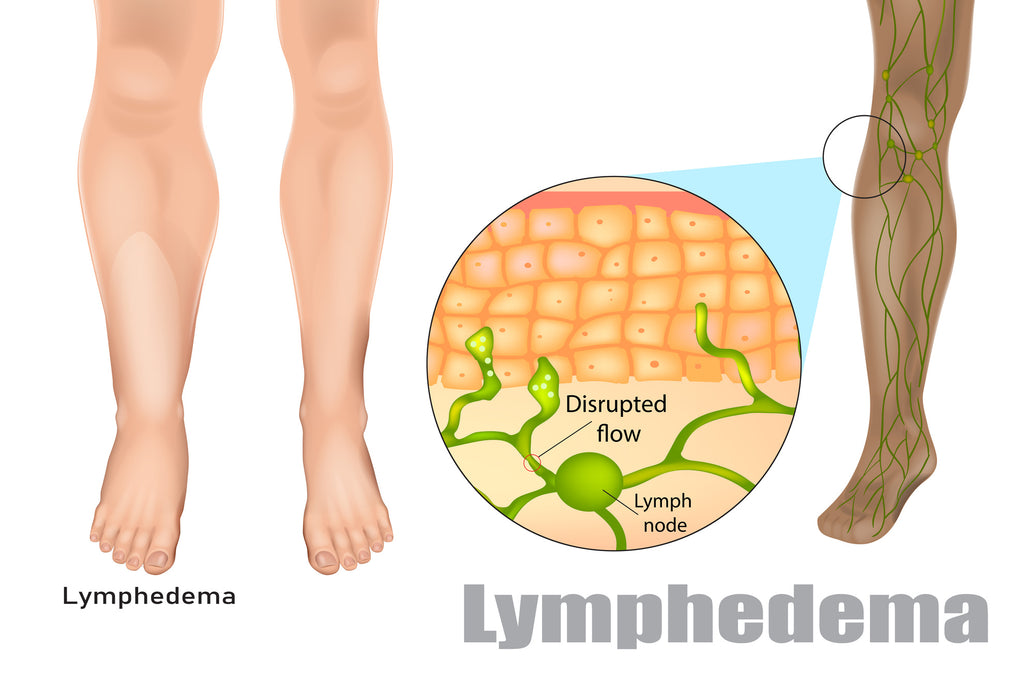Lympheodema (lymphedema) is a condition resulting from impaired flow of the lymphatic system and accumulation of lymph fluid in the soft tissues, usually in the arms and/or legs. Under normal circumstances, protein-rich lymph fluid is filtered by the lymph nodes and released into the bloodstream. But when the lymphatic vessels and blood vessels cannot properly transport lymph fluid because lymph nodes are obstructed, the fluid accumulates and tissues begin to swell.
Causes of Lymphedema
Lymphedema can be caused by injury, trauma or congenital defects in the lymphatic system. In developed countries, the breast cancer treatment is a common cause of lymphedema. In certain regions of the world, it often occurs as a result of a parasite infection. Also obesity and postoperative weight gain can cause or contribute to the development of this condition.

LIFESTYLE AND DIETARY RECOMMENDATIONS
- Don’t obstruct lymph fluid and blood circulation with excessive sedentary lifestyle, crossing legs while sitting, wearing tight underwear, etc.
- Lose weight if you are obese.
- Address poor circulation, nutritional deficiencies and lack of antioxidants by going on an unrefined plant-based diet (fresh vegetables, fruits, whole grains, pulses, seeds and nuts). Focus on whole foods, especially anti-inflammatory, blood and lymph thinning natural unprocessed foods such as fresh raw vegetable juices, vegetable smoothies and salads, soaked in water chia seeds and ground flaxseed.
- Exercising such as walking helps to move lymph fluid and reduce swelling. To keep your bodily fluids pumping back to your heart, you need to walk and exercise as many times during the day as possible.
- To reduce water retention in your legs, elevate both legs whenever possible in order to relieve pressure.
- Avoid foods high in salt (sodium) and instead of salt use only Sea salt, Celtic salt, or Himalayan salt.
- To provide your body with Potassium, avoid refined salt (sodium) and consume more Potassium –rich foods such as raw vegetable salads, potatoes (in skin), watermelon and bananas.
- Drink 8-10 glasses of distilled or at least properly filtered water every day (3 times 3 glasses between meals). Avoid coffee or soda drinks as they may dehydrate the cells even more.
- Eat parsley rot as it is a natural diuretic helping stimulate production of urine by the kidneys, thus drawing out excess water and reducing swelling.
KEY NUTRITIONAL SUPPLEMENTS
- Take at least 200mg of good Magnesium (such as Magnesium citrate) two times a day before breakfast and before bed. Studies proved that daily supplementation with magnesium helps maintain water balance.
- Also high strength Vitamin B complex (50-100mg daily) was shown to be beneficial. Take one after breakfast.
- Potassium supplementation may help reduce water retention by lowering sodium levels in the body.
- Vitamin B6 (pyridoxine) is thought to help hormonal balance and is beneficial in maintaining a healthy water balance in the body.
- Taking Aquaflow (rich in Potassium, Vitamin B6 and various herbal extracts) together with V-vein (containing Grape Seed Extract, Ginkgo Biloba Extract, Citrus Bioflavonoids, Ginger, Bromelain and Cayenne Extract) will help maintain healthy water balance, improve blood and lymph fluid circulation and strengthen capillaries and lymph vessels.
- Improve blood circulation with high potency Ginkgo Biloba extract.
- Citrus Bioflavonoids and Rutin are important for the health and elasticity of the small blood vessels and help reduce their permeability (one of the causes of water retention and swelling).
- Dandelion root and leaf tea is known as natural diuretic. In addition, it also helps liver and kidneys to eliminate toxins.
- Make sure you supplement your Vitamin D3 (5000 IU every day or every other day during sunny summertime).
EXTERNALLY
- A gentle massage toward heart will improve blood and lymph circulation and reduce oedema. Massage can help to move lymph fluid from the swollen places toward unswollen areas where the lymph system is still working.
- Mix 4 drops of Grapefruit essential oil or Fennel oil with one teaspoon of base oil such as Black Seed oil or raw Coconut oil. Massage the mixture (toward the heart) into the affected area at least two times a day.
- Skincare is very important because in this condition skin is prone to bacterial and fungal infections. You can use Black seed oil, raw Coconut oil, etc. for the skin care. Use Aloe vera gel to prevent sun burns.
SOURCES
https://draxe.com/health/lymphedema/https://vascular.org/patients-and-referring-physicians/conditions/lymphedema
https://www.cancer.gov/about-cancer/treatment/side-effects/lymphedema/lymphedema-pdq#section/_77
Any information or product suggested on this website is not intended to diagnose, treat, cure or prevent any medical condition. Never disregard medical advice or delay in seeking it because of something you have read on this website. Consult your primary healthcare physician before using any supplements or making any changes to your regime.





